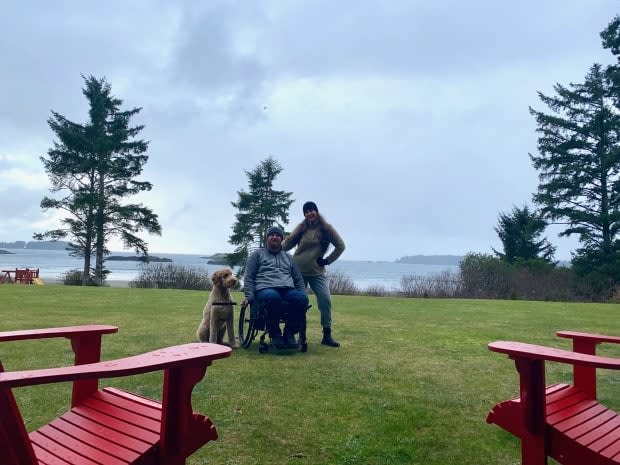Provincial funding programs should allow immediate family to be paid caregivers: advocates

Two years after a workplace tribunal ruled in favour of a quadriplegic man, requiring WorkSafeBC to permit him to hire his wife as his full-time caregiver, the couple is calling for changes to the program's policy against compensating an immediate family member for full-time care.
Vancouver resident Evan Brunelle was approved for WorkSafeBC's Self Managed Personal Care (SMPC) program in 2019, which provides funding to people who have been injured at work so they can hire their own caregiver.
However, it stipulates he cannot hire someone within "arms-length" — an immediate family member, spouse or long-standing partner.
After WorkSafeBC declined to make an exemption for the couple, Brunelle filed a complaint with the Workers' Compensation Appeal Tribunal (WCAT).
As a result, in 2021, WorkSafeBC granted the exemption. Now, the couple is calling for changes to the policy.
'I realized I can do it better'
Pagé has been Brunelle's main caregiver since he became quadriplegic in 2014, when he was injured while working at a construction site and paralyzed from the neck down.

At first, they tried to hire other caregivers, but had negative experiences. One nurse called in sick to 82 shifts, leaving Pagé to care for Brunelle while the nurse continued to collect pay through a separate funding program.
Another caregiver, who didn't follow instructions, injured Brunelle, sending him to the emergency room.
"I was able to get really good at his care and I realized I can do it better than [the other care givers]," Pagé said.
That's when Brunelle applied for funding through WorkSafeBC's SMPC program, whose criteria Pagé meets — including having first aid training, criminal background checks, and sufficient caregiving experience from looking after Brunelle for years.
She's learned to perform medical duties typically done by a nurse, like internal catheter procedures, and Brunelle's doctor has confirmed he is in good health and receiving quality care from Pagé.
But WorkSafeBC representatives repeatedly told Brunelle he could not hire his wife.
"I was told if my husband and I were to get divorced and I were to have a different address, then I could be hired," Pagé said.
Following the WCAT's ruling in 2021, WorkSafeBC finally made the exemption, permitting Brunelle to compensate Pagé for 40 hours of work per week.
However, the couple have pushed back on the decision, arguing Pagé should be compensated for more to reflect the 24/7 care she provides.
Instances of fraud, misappropriation of funds
In a statement to CBC, WorkSafeBC said the policy is in place because in some cases, they have seen the injured person's health decline and relationships deteriorate when immediate family is hired for full-time caregiving.
"While we cannot discuss specific claims, we have seen instances where non-arm's length care providers have been unable to provide consistent quality care ... there have also been instances of fraud and misappropriation of funds," reads the statement.
The Ministry of Health's Choice In Supports for Independent Living (CSIL) has a similar arms-length policy with exemptions for "extenuating circumstances."
While WorkSafeBC's program is for people who were injured at work, CSIL is for people with disabilities or non-work-related injuries who require at-home care.
"A family member, except an immediate family member ... may be paid to provide care for a CSIL client," the ministry said in a statement.
The CSIL policy was temporarily suspended during the COVID-19 pandemic, allowing applicants to hire immediate family. It resumed in April 2022.
A 'dated' policy
Caregiving specialist Jennifer Baumbusch says the policy is "dated" and should be reconsidered, especially amidst a caregiver shortage worsened by the COVID-19 pandemic.
"I think people are concerned about the vulnerability of the people receiving care ... historically, I understand the rationale to have an arms-length employer-employee relationship."
But Baumbusch says since the pandemic, the care-giving workforce has shrunk. In some situations, those looking to hire a professional caregiver won't be able to find one.
There are also situations where people prefer to be cared for by someone they know and trust — for myriad reasons, including experiencing PTSD from the health-care system, or vulnerability to infectious disease.
Baumbusch says the health-care system is saving millions, if not billions, of dollars in unpaid care work being provided by family.
"They have money sitting in the bank, there is someone doing care, that someone is a family member and they're not being paid."

Pagé had been set to start her dream job as a marketing manager for a beauty company a week after Brunelle's accident.
She turned it down to focus on caregiving, and due to its demands, she hasn't worked another full-time job since.
"I can't even step out for longer than an hour ... I think I've taken one night off since he was injured."
Pagé does it happily, however, saying she takes pride in providing quality care for her husband. But they say the policy needs to change so immediate family caregivers can be fairly compensated.
WorkSafeBC did not respond to specific questions from CBC about changing the policy.


